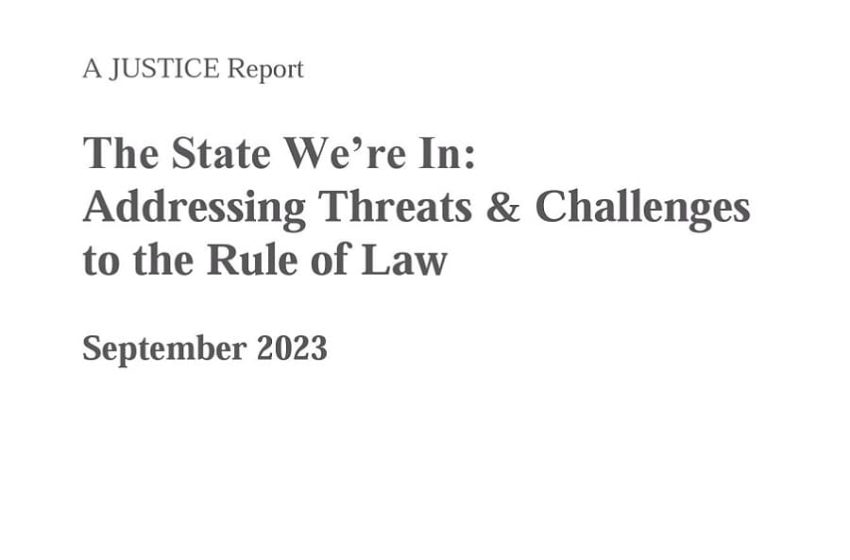
Rule of law “eroded” says landmark report
An influential legal charity has lambasted the current state of the UK legal system, describing how a “regression” in the rule of law “threatens the very democratic fabric of our nation.”
JUSTICE, a cross party legal reform charity, has released a comprehensive new report entitled “The State We’re in: Addressing Threats & Challenges to the Rule of Law” which points to poorly conducted public consultations, a perceived reduction in freedom of speech and thought, the use of secondary legislation, also known as as “Henry VIII powers,” to amend and repeal law, and cuts to legal aid as evidence of a “less transparent, less accountable, less inclusive, and less democratic” system of lawmaking.
The report points to successive government failings to to address what is describes as a “creeping complacency” amongst lawmakers to properly scrutinise legislation; a trend exacerbated by Brexit and the COVID-19 pandemic during which executive powers have effectively bypassed parliamentary scrutiny. It also highlights the expansion of state powers through recently introduced legislation, including the Judicial Review and Courts Act 2022 and Nationality and Borders Act 2022.
“There are multiple reasons why we have reached the parlous state we are in,”
Fiona Rutherford, Chief Executive of JUSTICE comments.
“Each one viewed in isolation does not amount to the wholesale negation of the rule of law – but taken together they create a picture suggesting that the rule of law is being incrementally undermined. We believe we have reached a tipping point and are determined to highlight a route back, before the UK’s standing both at home and abroad is fatally diminished for a generation.”
Adding
“The backsliding on the rule of law over the last decade has real implications for us all. Protestors could face prosecution, potentially even for something as innocuous as challenging the closure of a library. The ability of people to hold the Government to account when they have been wronged at the hands of the state, has been reduced, while at the same time, the law-making process has become less transparent and less inclusive.”
“Ever more rules and regulations are being imposed without proper democratic oversight from Parliament. Society’s most marginalised or vulnerable, such as migrants, prisoners, and victims of police action, lack automatic access to justice and are a bellwether for the human rights reduction we all face.”.
The report makes a series of recommendations to halt the slide, urging lawmakers to “take bold action:”
- Repeal “problematic” legislation passed since 2019 which ignores rights-based considerations; including the Covert Human Intelligence Sources (Criminal Conduct) Act 2021, Parts 3 (Public Order) and 4 (Unauthorised Encampments) of the Police, Crime, Sentencing and Courts Act 2022, the Public Order Act 2023, and the Illegal Migration Act 2023.
- Consider the use of ‘skeleton legislation’ as exceptional, not convenient. and should be fully explained and justified.
- A reduction in the reliance on ‘Henry VIII’ powers and only used when “objectively necessary.”
- Strengthen public ownership of human rights; 73% of UK adults believe that rights, laws, and protections must apply to everybody equally.
- Address the use of inflammatory language that disparages the legal profession. The legal profession and judiciary play a crucial role in upholding the rule of law. Lawmakers should support, not undermine, a positive public perception of the judiciary and lawyers.
- Prioritise tackling inequalities (for example through making Equality Impact Assessments mandatory) and comply with Public Sector Equality Duty; which in turn would increase transparency and provide a clear rationale for the Government’s position and decision-making in the event of judicial review proceedings.
JUSTICE’s President, Baroness Helena Kennedy of the Shaws KC concludes:
“The past five years have seen an escalating trend in legislation and policy which fundamentally challenge human rights protections in the UK, from the ‘Spy Cops’ law to the Illegal Migration Act. As a consequence, the rule of law in this country is under unprecedented threat, and reversing this trend will take hard work and consensus across the political spectrum. We call upon all policymakers to properly consider this report and act upon it. The UK should be leading the way as a stalwart in the rule of law and democracy, not rolling back domestic protections.”
Commenting on the report, Law Society of England and Wales President Lubna Shuja said:
“This is a timely report and we share the concerns of JUSTICE over what has been a gradual and worrying trend towards the erosion of fundamental principles of the rule of law. Successive pieces of legislation, including the Illegal Migration Act and the now aborted Bill of Rights Bill, have sought to disregard our obligations under international law. They have rolled back legal protections for human rights and created undue barriers to accessing justice.
“We are also concerned about the government’s attacks on lawyers. No lawyer should be criticised, or made the subject of a targeted campaign, for doing their job. Lawyers who represent their clients are not only doing nothing wrong, they are doing exactly what they are supposed to do, in playing their part to ensure that the rule of law is upheld
“We are also concerned about cuts to legal aid. Our legal aid desert maps show that millions of people now live in areas where they can no longer access the help and advice Parliament says they are entitled to.
“Our criminal justice system is in crisis with crumbling courtrooms, huge backlogs of cases and delays for court users as well as a chronic lack of personnel. We urge the government to put in place the reforms and long term funding needed to stabilise the system.”
“The State We’re in: Addressing Threats & Challenges to the Rule of Law” can be read in full here.










